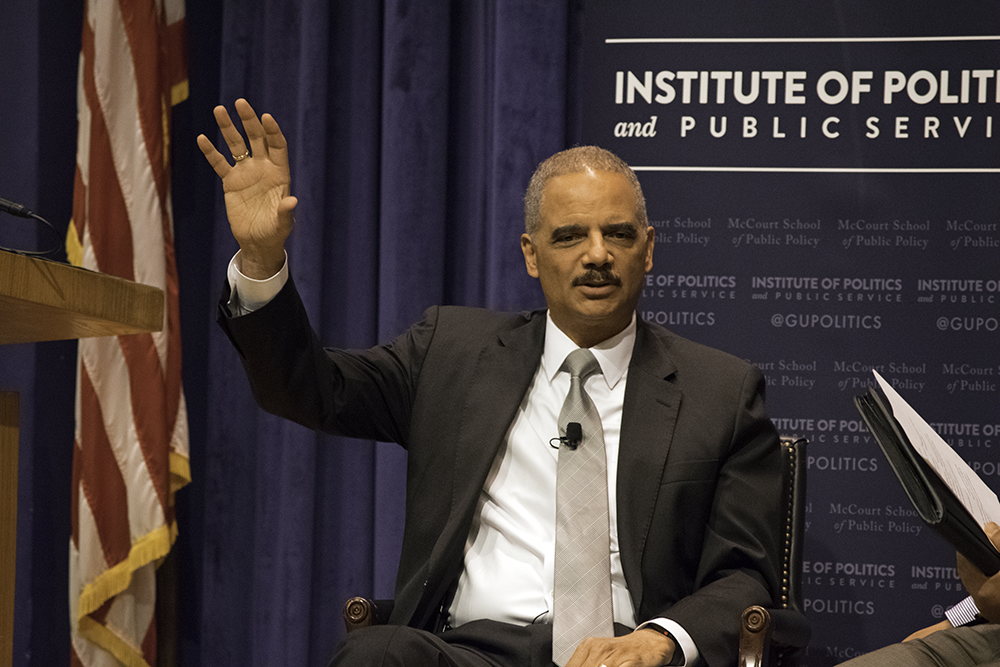Partisan gerrymandering poses a threat to voting rights in the United States and disproportionately disenfranchises Democratic voters, former Attorney General Eric Holder said at an event hosted by the Georgetown University Institute of Politics and Public Service on Monday.
The event, moderated by GU Politics Executive Director Mo Elleithee (SFS ’94) in the in the Intercultural Center Auditorium, sought to offer Holder’s perspective on the state of redistricting in the country. Holder currently serves as chairman of the National Democratic Redistricting Committee, a Democratic Party-affiliated organization for redistricting reform.
“Politicians are choosing their voters instead of citizens picking their representatives,” Holder said. “The system that we have in place is inconsistent with our founding documents, inconsistent with the Constitution, inconsistent with a variety of statutes: We are depriving people, in essence, of their right to vote.”
Since serving as attorney general under former President Barack Obama from 2009 to 2015, Holder has been committed to fighting partisan redistricting, commonly called gerrymandering, a practice in which politicians manipulate the boundaries of congressional districts to favor their own political party’s chance of winning.

Holder sees gerrymandering as an unconstitutional practice that is widespread across the country. Holder said he has a four-part plan to combat gerrymandering: litigation, reforming individual states’ redistricting processes, mobilization and electing pro-reform candidates.
The first step, litigation, requires taking instances of gerrymandering to the courts to put their constitutionality in direct question.
“Some places are so gerrymandered, you can only approach them through courts,” Holder said.
The second step of Holder’s efforts is reform of the redistricting process itself, which he believes can be created through new nonpartisan commissions — only currently allowed by 17 state constitutions, according to Holder — to monitor the redistricting processes. In other states, citizens should push for the creation of nonpartisan commissions, he said.
Holder’s third step refers to public campaigns in mobilizing opposition to gerrymandering and informing the public about the effects that gerrymandering can have on their lives. Holder has worked with groups like Organizing for Action, which morphed out of Obama’s 2012 re-election campaign, to spread awareness about the effects of partisan gerrymandering.
Holder said it is crucial to “raise the consciousness of the people about this whole question of gerrymandering, making people understand that this has an impact on their day-to-day lives.”
The fourth element of Holder’s plan is to elect pro-reform candidates who would have a direct impact on the redistricting policies, he said. His efforts support Democratic candidates because Republicans “aren’t simply going to give up power,” according to Holder. Although there are examples of districts gerrymandered by Democrats across the country, Holder said the Republican congressional majority generally benefits more from partisan redistricting.
Elleithee pushed back on Holder’s statement, voicing the concern of many conservatives that current redistricting efforts are giving Democrats an edge by primarily targeting GOP-drawn maps.
“I’m trying to make this a fair fight,” Holder responded. “You give me a fair fight; I’ll have a Democratic Congress.”
Holder said he would be willing to work for reforms in states with Democratic gerrymandering but pointed out discrepancies in partisan redistricting.
“We tend to think there is this equivalency,” Holder said. “If Republicans do something bad, let’s find where Democrats have done something bad. Oftentimes, there is not that type of equivalency, and this is a situation where I would push back on that.”
Looking forward, Holder is focusing his efforts on combating voter suppression laws and ensuring a fair, accurate census in 2020.
“At the end of the day, this is all about allowing the American people to have their voices heard, their votes count and to have their representatives reflect what their desires are, at the state level as well as the federal level,” Holder said.
Addressing the Georgetown crowd, Holder encouraged students to take ownership of politics to influence their country.
“You are leaders for this country in the 21st century; it is incumbent on you to think about the responsibility you have as leaders,” Holder said. “If you do not put yourselves out there, others who are less qualified — or less idealistic — will fill that vacuum.”




















